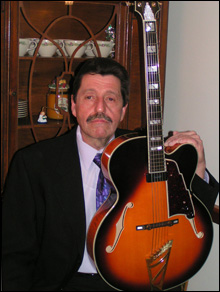
PLAYING PRETTY In his collaboration with tenor saxophonist Harry Allen, Beaudoin felt he could show another side of himself. |
My first encounter with guitarist Gerry Beaudoin was as a fellow judge at a long-ago battle of the blues bands at Harpers Ferry. The night had been kind of a slog, and after three bands, Beaudoin — who'd been withholding comment all night — looked at me and said, "I don't get it — don't these guys listen to any blues records?"When I get Beaudoin on the phone from his home in Waltham, he laughs at the memory. "I know: the idiom was born in 1980 with Stevie Ray Vaughan." He then reminds me that the evening was redeemed by the wonderful Boston guitarist Peter Parcek, who went on to win.
If anything, Beaudoin knows his history. And you can hear it in every phrase of The Return, which he celebrates in a CD-release show at Scullers on September 8 with his longstanding trio (bassist Jesse Williams and drummer Les Harris Jr.) and the guest saxophonist from the album, Harry Allen.
Beaudoin combines a deep knowledge of blues (he still gorges himself on recordings by T-Bone Walker, Muddy Waters, and B.B. King) but also the post-bop swing of Kenny Burrell and Bucky Pizzarelli. The latter inspired him to pick up a seven-string guitar and to hone his skills spinning out improvised melodic lines in chords as well as single-note phrases. Overall, he developed an orchestral idea of the guitar that was reinforced by his studies at Berklee with the late Bill Leavitt.
What this means on The Return is a detailed, richly colored sound in which Beaudoin's unbroken legato line is a match for Allen's rhapsodic tenor. Check the descending sequence in Beaudoin's solo on his original soul-groove "RSG," with its stepping-stone passing tones, followed by the "orchestra" as he opens up with chording. He's even more eloquent on the trio arrangement of "God Bless the Child."
"I read once that I 'play pretty,' " says Beaudoin. "But I don't mind playing pretty." He mentions Burrell — "he always takes his time building tension, and he never shows off his technique." Even gritty urban-blues players like Walker and King, he points out, "play blues with a nice, relaxed, legato swing."
Beaudoin says that the partnership with Allen — renown for his glowing tone and swing feel — is like a dream come true. "I've been looking for this guy for a long time. Most of my collaborations have been with guitarists." In recent years, Beaudoin has been heard most often around town in New Guitar Summit with J. Geils and either Duke Robillard or Howard Alden.
Although that collaboration, too, was focused on jazzy swing rather than pitched battles, Beaudoin points out that "the guitar world expects competition." He met Allen at a gig in 2009 at Showcase Live after Beaudoin had recovered from a six-month bout of what turned out to have been undiagnosed pneumonia. During his illness, with nothing to do except lie on the couch and watch movies on TV, Beaudoin started writing tunes — dozens of them — pieces that would showcase "a different side of myself," with a horn instead of another guitar or a pianist.